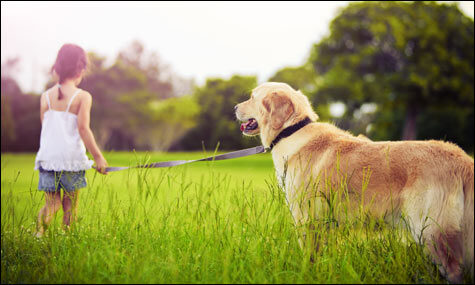Dogs and Kids: How to Keep Them Both Happy

Contribution from freelance writer Jenny Holt.
Being kind to others is an essential life skill which all parents should teach their children. It’s important not to forget animals though – they are just as deserving of kindness and respect as people. Having an animal in the family can be great fun for children, and really helps to develop their ability to care and empathize. However, it is essential to make sure both children and pets are taught some basic ground rules, so that everyone feels comfortable and stays safe.
Understanding One Another
Young children are the most likely family member to be bitten by their dog, but this is mainly down to a lack of understanding. Children interact with dogs differently to adults – they are louder and are often more physical in showing affection. While this might be seen as cute, it can be stressful for dogs, who just like humans, do not have an endless supply of patience. Learn to recognize the signs of an irritated, anxious, or scared dog, and teach these to your kids – this is when a dog is most likely to snap, so make sure they know to back off.
Ground Rules
Children will copy and learn from how adults act around them, so always set a good example. Be polite to your dog, and make sure your children treat them like a person rather than a toy. Just as people do not like to be disturbed when they are sleeping, dogs prefer to rest uninterrupted. Designate a “safe space” for your dog, probably his crate or basket, and teach your kids not to bother him when he’s there. Your dog will quickly learn that if he wants to be left alone, this is where to go.
Fun and Games
Some simple games can also help to enforce good behavior on both sides. A game of fetch is fun for everyone, but make sure your kids know that, like if they were playing with other children, snatching toys isn’t okay. Equally, your dog should be well-trained to give up a toy gently and without acting possessive. Involving your child in the dog’s care and training is a great way to encourage empathy and understanding on both sides: your child will become more familiar with your dog’s behavior and what games he likes, and your dog will associate your child with fun, treats, and positive experiences, and be more tolerant of them.
Brain Training For Your Dog

